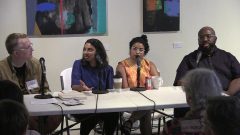 Charity Cruz – Reflections on the 2018 Guelph Jazz Festival Colloquium
Charity Cruz – Reflections on the 2018 Guelph Jazz Festival Colloquium
A Reflection from Emerging Scholar Charity Cruz, on the 2018 Guelph Jazz Festival Colloquium: Hovering at the Edge: Words, Music, Sound, and Song.
“We are immigrants!” says John Sobol, baritone saxophonist of SUNG RA: The Rakestar Arkestra, opening act for the 2018 Guelph Jazz Festival and Colloquium.
During this year’s Guelph Jazz Festival, I had the greatest honour of taking part in the Colloquium’s Emerging Scholars program. It was a great opportunity to attend a local music festival that I already loved, and to attend it with greater criticality and more opportunity for discussion.
By the end of the first night’s act, I was in disbelief at what I had heard and observed. I appreciated the music put forth by these musicians, but I could not appreciate the message shared. The simple lack of acknowledgement of the deep roots of Afrofuturism and its importance in demonstrating black nationalism counter narrating its present culture left me bewildered. As a Canadian immigrant, it left me feeling weird and uncertain. The mere existence of jazz is a celebration of black culture, with its origins coming from a context of suffering and solidarity. Ties to jazz and immigration are important to the global African diaspora, with individuals often feeling disconnected from or unfamiliar with their own cultural roots. I feel this is an important point, especially concerning a group that is devoted to Sun Ra’s songs and poetry. It felt problematic to see this act unfold from white voices, especially considering jazz’s cultural context and origins, and in talking about immigration, even if the performance was a tribute.
As the days continued, this act brought my reflections to another level. The beauty coming from musicians such as the James Brandon Lewis Trio and William Parker was outstanding. Hearing the James Brandon Lewis Trio at Market Square left me speechless as they seamlessly moved into groovy and free moments. Weaving through accessible grooves in inaccessible tonal territory, it captured all sorts of listeners through heavy-hitting beats that transcended their non-mainstream sounds. It felt like a connection to the soul, and it was the same thing that drew me in to William Parker’s solo act. Set in the beautiful acoustics of the Royal City Church, his soft vocals came in as a mantra of repeated phrases, while his strong, reflective bass flowed over. Their voices as musicians and what they stood for was heard through simple notes; direct communication was unnecessary. I felt what they wanted the listeners to hear, and it was a deep and profound feeling of their direct self-expression. There was no claiming of another identity, no search for who they wanted to represent themselves as. It was a clear and confident sign of who they were and what they wanted to represent to the world.
On another note, speakers such as Brent Hayes Edwards, and panel talks led by Darius Jones and Meta DuEwa Jones made me further appreciate the history and significance of African American art-making on a multitude of levels, and the unfortunate truth of present day mis-representation and appropriation. Overall, I found I gained a deeper understanding of jazz as a means of communication and building community through self-expression, specifically and especially for the historical oppression of black folks that is present to this day.
Inspired by the initiative developed by our friends and colleagues at the ArtsEverywhere Festival, and in partnership with the University of Guelph, the Emerging Scholars program offers scholars from all levels of study the opportunity to participate and engage with participants in our Colloquium program. They also receive complimentary attendance at two ticketed Guelph Jazz Festival performances, an intimate “Scholar’s Dinner” with Colloquium presenters, artists and participants, and an opportunity to publish their writing about their Festival and Colloquium insights on the IICSI website.







